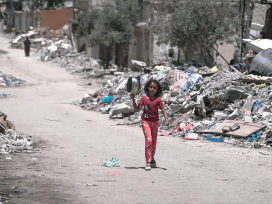Schmucks and miniskirts
Extremists are not interested in distinguishing between artistic merit and gratuitous provocation: they want total silence. To restrict freedom of expression to pacify Islamic extremists is patronizing and offensive to moderate Muslims, because it portrays them as being irrational, says Salil Tripathi.
And so it has come to this. In 1989, Ayatollah Khomeini posed a stark choice: would we support an author’s right to express himself freely, or would we stand by as he is hunted down by state-sponsored assassins? Margaret Thatcher was no fan of Salman Rushdie, but her government supported his right (at least in the early years), even as British Muslims burned copies of The Satanic Verses in Bradford and riots spread in South Asia.
Today, another British government praises the British media for its restraint in not republishing the Danish cartoons that have offended many Muslims. The state department has called the cartoons offensive. Is this restraint? Or is it acquiescence?
Suddenly free expression is a matter of accounting, of balancing costs and benefits. We are all judges now, preferring the good of public safety to the harm of public disorder and death threats. How did we get here? Think of 9/11 and 7/ 7, two seminal events which dictated editors’ and politicians’ choices in Washington and London.
The saga of The Satanic Verses was supposed to have clarified the issue. But since 1989, the determination to defend free speech against mobs has weakened. All faiths have an intolerant streak, and each intolerant act emboldens the next. Sikhs in the Midlands halt performances of Behzti, a play raising awkward questions about their faith. Hindus in India ransack an art gallery and destroy canvases by the elderly artist MF Husain, who has drawn Hindu goddesses in the nude. And a young Muslim executes Theo Van Gogh in Amsterdam, because his film Submission offends the immigrant.
Jack Straw’s worry about mobs reminds me of Khushwant Singh, a well-known writer and consulting editor for Penguin India, who was shown an advance copy of The Satanic Verses and advised against its publication because it would cause riots. Khushwant Singh was right, but only partly: the riots took place anyway, even though Penguin India did not publish it and India banned it hoping this would ensure its safety.
I was a correspondent in Bombay at that time, and off Mohammed Ali Road I saw the police battle a procession of Muslims who wanted to proceed to the British Council Library and burn it (it did not have the book). I had already written against the Indian ban on The Satanic Verses. I derived my position not only from Voltaire’s defence of ideas he disagreed with, or Milton in Areopagitica, or John Stuart Mill’s thoughts, but also from my own traditions and thinkers. The Nobel Laureate Rabindranath Tagore wanted India to awaken in that heaven of freedom “where the mind is without fear and the head is held high”. Mahatma Gandhi had said freedom is not worth having if it does not connote freedom to err.
Freedom of expression, then, was not only the product of Western Enlightenment; it belonged to all of us. And it included the right to say something outrageous, something offensive and even something stupid. Speaking to Der Spiegel, Pnina Werbner of Keele University says: “There’s a difference between a novel of great merit […] and […] cartoons that are in many ways trivial, have little artistic merit and are deliberately provocative and gratuitous.”
But who decides artistic merit? What constitutes provocation? In the neat world of academic distinctions, Werbner may be able to separate the two and say, Rushdie yes, cartoons no. But the assassin will target both. If the priority is to avoid provoking him, we have lost the battle already, for he wants total silence. To take a sartorial analogy, it is like telling women not to wear miniskirts because they’ll inflame passions. There are no half-measures, like checking the appropriate length of the skirt. In such a circumscribed universe, it is hijab or bust.
The idea that we restrict our freedom to express so that those who get offended easily may not go berserk is deeply patronizing and even more offensive to Muslims: it portrays them as unthinking hotheads influenced by emotion. Everyone has the right to speak; the right not to listen; and the right to be a schmuck (like David Irving, who deserves his freedom as much as does Orhan Pamuk). Maybe those Danish cartoonists are schmucks, and the European editors are only trying to provoke. We should still support those rights. Otherwise, we have to swallow our words and thoughts. And if we do that, we shall have little to talk about and less to debate. And our conversation with those whom we must not provoke will only be about agreeable topics, like the weather.
Published 17 February 2006
Original in English
First published by www.indexonline.org (will appear in Index on Censorship 1/2006: "Small Wars You May Have Forgotten")
Contributed by Index on Censorship © Salil Tripathi/Index on Censorship Eurozine
PDF/PRINTNewsletter
Subscribe to know what’s worth thinking about.



